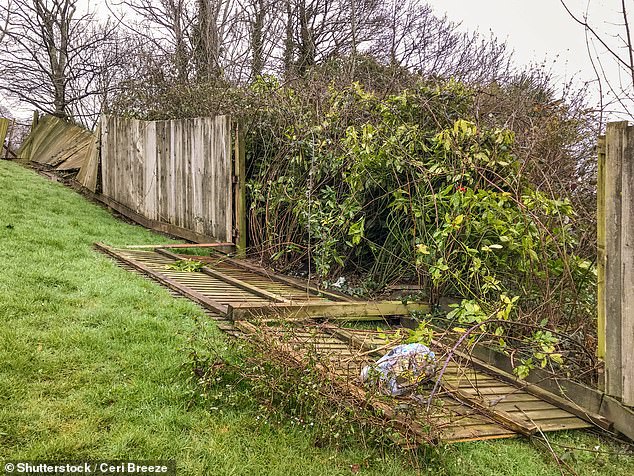Table of Contents
I woke up on Sunday morning to find that four panels of the fence bordering the left side of my garden had been knocked down as a result of Storm Darragh.
I asked my next door neighbor to split the repair work fifty-fifty, but he flatly refused saying it’s not his responsibility to fix it or pay for it.
First, he tried to claim that because it is on the left side of my yard (and the right side of his), it is my responsibility.
And then he had the nerve to say it wasn’t his problem because I fixed the fence the last time it came down several years ago and therefore the new fence is mine, not his.
Is it true that if I replaced the fence panels a few years ago when they came down, because my selfish neighbor refused to help on that occasion as well, I am now legally responsible? If not, is there anything I can do?
Fence battle: border fence repairs are a bone of contention between many neighbors
Ed Magnus from This is Money answers: You’re probably one of the many who has woken up to a collapsed fence thanks to Storm Darragh.
Storm Darragh brought winds close to 100 mph in some areas and left a trail of destruction in its wake.
One would hope to have a moral and reasonable neighbor for times like this. Unfortunately, it appears that your neighbor does not possess any of these qualities.
Whatever their reason, whether financial or the fact that they simply don’t care that there is a fence, it may be futile to try to persuade them to shell out their share.
You probably won’t be the first or the last person to oppose your neighbor over the garden fence.
‘Love your neighbor as yourself’ is all well and good, but as the poet Carl Sandberg once added: just don’t tear down the fence.
Over the years we have received emails about a neighbor who stole someone’s garden. Another person asked if they could put up a high fence to prevent their neighbors from overlooking them.
And one reader sent an email about his neighbor’s dog jumping on his fence so relentlessly that he was in danger of knocking it over.
To get expert advice on your situation, we spoke with two legal experts, Mike Hansom real estate litigation consultant at BLB Solicitors, and Chun Wongpartner at Hodge Jones & Allen.
How to establish who is responsible for the fence?
Chun Wong replies: There are no standard assumptions about boundary responsibilities; It is a common misconception that you own and are responsible for the fences on the left.
As a starting point, you can check copies of the property titles or obtain an official copy of the title and title plan from the Land Registry.
Title documents (such as the title plan) may contain covenants that establish who is responsible for maintaining a boundary fence.
If there are T marks on the boundary line, that can show who is responsible for maintenance; If there is a T mark on both sides of the boundary line, then it is a boundary between parties and maintenance is a joint responsibility.
If there is no indication on the title deeds or property plan as to who is responsible, then you need to consider whether someone has taken on responsibility for the maintenance. For example, paying in advance for the maintenance of the fence.

Chun Wong, a partner at Hodge Jones & Allen, says it’s a common misconception that you own and are responsible for the fences on the left.
Mike Hansom adds: In modern housing developments, deeds often confirm responsibility for maintaining a boundary feature, such as a fence with a T symbol pointing toward the responsible person’s yard. Joint liability may appear as an H shape on both sides of the boundary line.
However, in English law, these positive obligations are usually enforceable only between the original parties, that is, the developer and the first purchaser.
Once sold, the right to enforce is generally lost unless a construction project gives neighbors the right to enforce each other’s covenants or buyers sign covenant deeds whenever there is a change of ownership.
If they replaced the fence before, is it their responsibility now?
Mike Hansom responds: If you replaced the fence last time, it’s your fence and, unfortunately, your neighbor may be right that you have no legal obligation to contribute.
Remember, if this differs from what the deeds say, you must mention it on your Property Information Form if you sell.
Chun Wong adds: In the event that you decided to pay for the maintenance of the fence yourself, it could be argued that you have assumed responsibility for the maintenance and therefore ownership of the boundary fence.
You should make it clear that if you decide to make any payment for fence repairs, you will do so without prejudice to who is actually responsible and reserve the right to claim 50 per cent of the costs from them.

Mike Hansom, property litigation consultant at BLB Solicitors, says if you replaced the fence last time, it’s your fence and it may now be your legal responsibility.
What if they had not previously paid the maintenance?
Chun Wong replies: If no one has taken responsibility it could be argued that it is a joint responsibility.
If your neighbor is jointly responsible for maintaining the fence and fails to do so, you may consider filing a claim to recover your share of the costs incurred by making the repairs yourself.
What should they do?
Mike Hansom responds: Living next door to an unreasonable neighbor is frustrating, but you should proceed carefully because even if you are legally right, you should disclose any disputes between neighbors when you come to sell.
It can help with negotiations if you can point out a support obligation in the deeds.
Even if the deeds support it, it is notoriously difficult to force neighbors to act because the legal proceedings usually far exceed the cost of repair.
Although it may be irritating, the most practical alternative is usually to replace the panels yourself.
Some links in this article may be affiliate links. If you click on them, we may earn a small commission. That helps us fund This Is Money and keep it free to use. We do not write articles to promote products. We do not allow any commercial relationship to affect our editorial independence.


